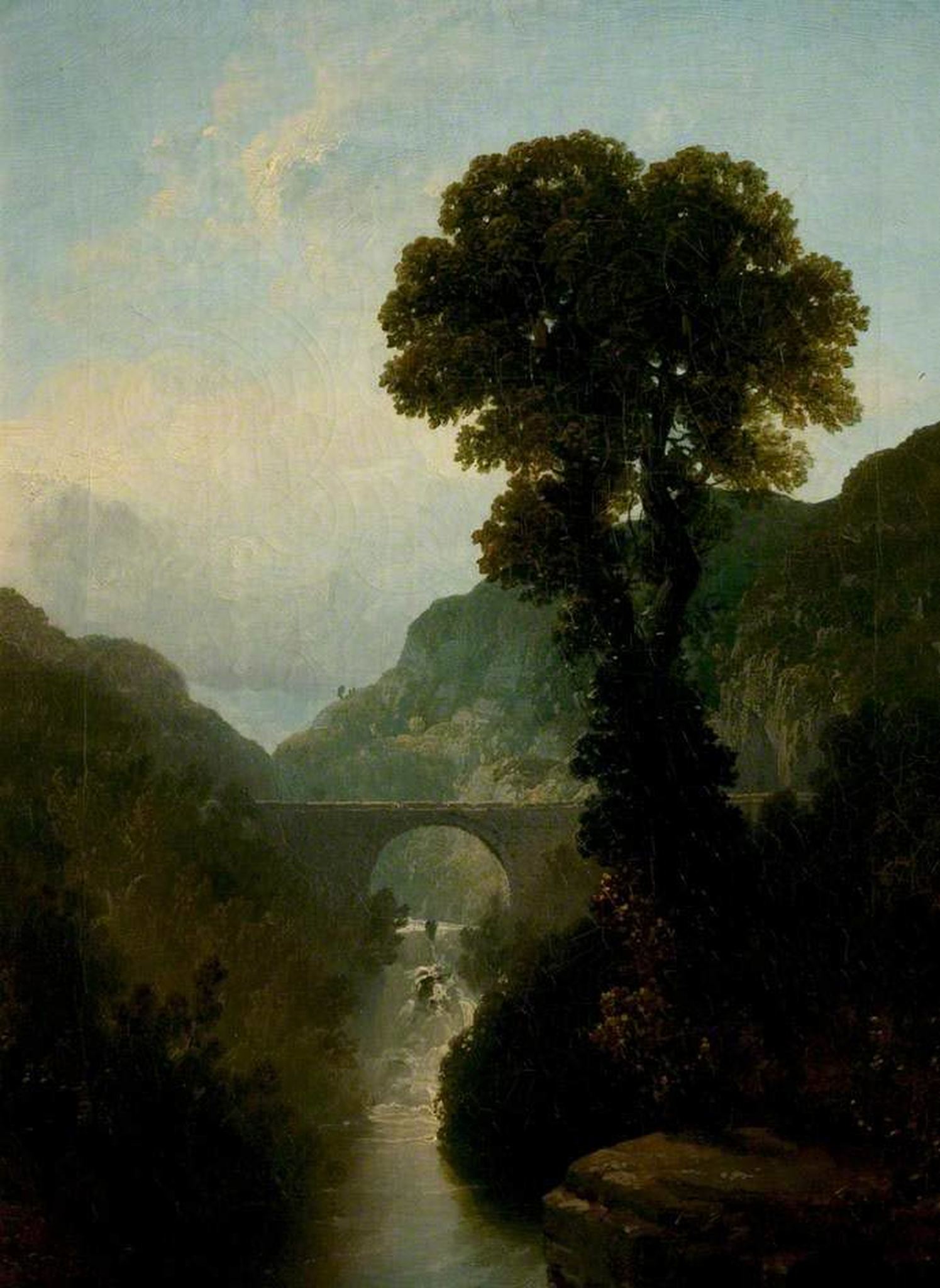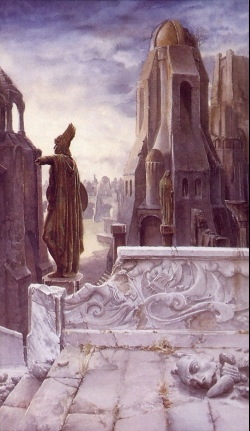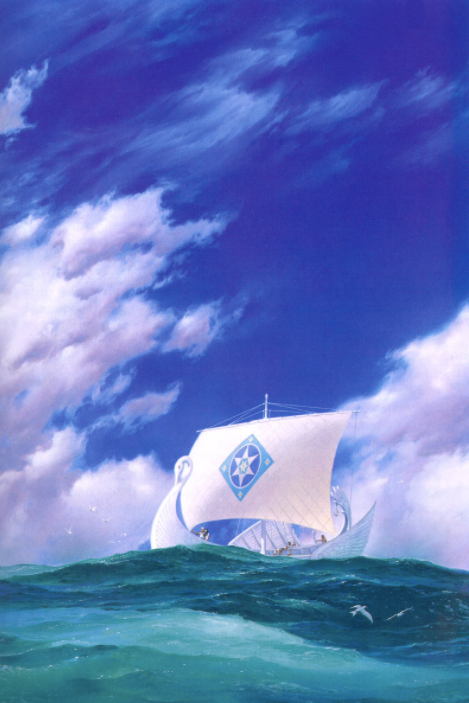Pasikrates
Asklja Pasikrates Viikiin (a.k.a. Hyaraelf)
Paskirates Hyaraelf was the mightiest and most dreadful fighter in the Second Empire of Nelqora. He was of the Nelqorana stock. Written statements about him indicate that he was probably the greatest warrior to have ever been produced by that people. His fame has resounded through history—today he remains the exemplar of the martial artist—but because of his butchery, with little state-building, he was not considered as Nelqorana N'kine, such as Azrübel the Red Bear, Tipnir the Engineer, or Detheril the Mariner. He is instead eulogised as Nelqorana N'phere. While Nelqorana culture tended to praise him, there was a general unease about his figure because of his savagery in battle.
His date of birth is unknown. He died at the Battle of Heidrun, where it was said that the sun god Nairlr shot him with clattering, ray-like arrows. He was always described as shockingly beautiful, with features fine like a girl's. It does not seem that his appearance changed at all throughout his life. But as he was present during Azrübel's conquest of the Altaic Elves, and proved instrumental in those campaigns (1155-1165 YoN), he would have been scarcely younger than Azrübel, who was 44 at the time. But while Azrübel was described as hoary and wrinkled during the Third Wave Invasion of the Mountains of Das EkLachen (1300-1311 YoN), Pasikrates was described as still beautiful and youthful, his face filled as if with immanent light.
Many legends about Pasikrates rose after his death. Many believed that he still lived but bided his time in some hidden cave in the North. Still others claimed that he was slain but was reborn as a child. And there were those who murmured that he was a god in human form, temporarily come down to force the fate of Nelqora towards that of empire.
Childhood and Career in the Altaic
Rage - Goddess, sing the rage of Peleus' son Achilles. Murderous. Doomed

Pasikrates' father was called Saarni. His family name was Viikiin, which claimed descent from Venebrian, a legendary hero who served the House of Bel during the Wars of Hate. The Viikiin were of Abattarick origin, hailing from the wooded coastal regions, and made their family income in herding gold-wooled sheep. Beyond this, there is not much known about his childhood. The Viikiin were not especially wealthy, but the prestige of their name was great enough that Pasikrates could climb the non-meritocratic ranks of the Imperial Army of Nelqora. There is nothing written directly about Pasikrates' father, who seemed to be a recluse, refusing to leave his manor grounds. There is still less on his mother, whose name we do not know.
Pasikrates makes his first historical appearance in the logs of a captain written during an expedition into the Altaic Country. The captain remarked on the youth's strength and his ability with the spear. Pasikrates then disappears from the records for a little while; he reappears under the writings of Azrübel, a powerful strongman and general heading the expedition into the Altaic Country. Pasikrates had quickly distinguished himself in combat and his abilities like-god soon won over the favor of the masses of soldiers. While it was unusual to reward a youth so handsomely, Azrübel made Pasikrates his Companion.
The decade long campaign to subdue the Altaic Elves was grinding into a stalemate. The Nelqorana were stretched over the vast recently conquered territories. And it was a cold, hard land. Attrition accounted for about half of all casualties. The Altaic, long divided, were now united under the High King Masikällen, who proved to be a brilliant strategist and was much loved by his people. Azrübel, desperate for funding and men from the Homeland, needed a clear example to prove to the Senate the feasibility of continued war. He set his gaze upon the city of Illum and began a siege. To protect against sallies, he built a high palisade which the Nelqorana manned day and night.
It was here that Pasikrates proved his strength and earned the moniker Hyaraelf, the Elf Hewer. An allied force of the Altaic was coming up from the south, through a narrow hill land. Azrübel was forced to defend against the attack. He built behind him another palisade so that the Nelqorana were enclosed in a rim. The day his allies arrived High King Masikällen sallied from his walls, and he brought with him all the fighting men of the city; he intended to crush the Nelqorana entirely.
Thus began the desperate defense of the Nelqorana against the Altaic. The fighting was fierce, and the flow of men between the palisades was ever-shifting as Azrübel dictated to this and that contingent to shore up this and that defense. The Companions of Azrübel were sent to the segments of the wall in most desperate need. It was in this way that Pasikrates found himself commanding the defense against the direct assault of Masikällen, standing high in his silver sleigh, swinging his crooked sword and reaping men as wheat in a harvest.
Pasikrates went out with a few companions, among them his dearest friend Tabathû, and met the High King of the Altaic and his guard in mortal combat. Paskirates fell into the tempest of his wrath and many Altaic fled in amaze at his dreadful eyes; the rest were butchered. Then, Pasikrates reared his spear and threw it like a thunderbolt, and by it he smote the breast of Masikällen. The High King fell from his sleigh, his blood staining the snow, and his driver spun around to return to the city, though he was struck in turn by another spear from Pasikrates.
The Altaic fell into despair at the news of the death of their king. Their armies quickly routed, and the Nelqorana took Illum. But there was no chance of a regrouping for the Altaic. They simmered without their beloved king and their ancient bickering began anew. The Altaic broke apart into their disparate clans after the death of Masikällen and proved to be easy pickings for the Hosts of Nelqora. Azrübel received his desperately needed money and reinforcements from the Senate. The Altaic Country was at last brought to heel and fully integrated into the provincial system of the First Empire of Nelqora. Pasikrates' name was forever cemented as that of a hero's. He gained much glory. Shrines dedicated to his genius were raised in Nelqora. His later command of the conquests of the Altaic clans encouraged Azrübel to create the station of Asklja. Pasikrates was the first assigned this rank, as he proved not only competent in martial combat but also strategy.
Pasikrates' exploits were immortalized in the epic poems Vahnta Pasikrates and Illivum; both were written by Alpertiik.
Times of Troubles
Then there was great unrest in Tirion, and Finwë was troubled; and he summoned all his lords to council.

Civil conflict was not unknown in Nelqora, but the Times of Troubles proved to be too much for the government of the First Empire of Nelqora to handle. The Times of Troubles was a decade long period beginning in 1205 Year of Nelqora during which there were civil conflicts between the Expansionist and the Isolationist parties. They were led by Azpha'oros and Ciryatur, respectively. The Expansionists were largely supported by the Royal family—although some detractors, such as Iphilzebel, played vital roles for the Isolationists as financiers and suppliers of weaponry. The civil revolt was also played along lines of legal freedoms afforded to the varied populace; there had been a rising intellectual movement supporting the freedom and dignity of all. The matter of slavery was also debated for and against, although in the end nothing substantial crystallized. The conflict soon grew beyond the political centers in the Vale of Abo and consumed the entire island. But in the end, Ciryatur defeated the Expansionists and deposed the Emperor. The Commonwealth of Nelqora was established.
Pasikrates had traveled to Nelqora after his successes in the Altaic Country and was stuck there because of the civil revolts. It was said that he played a vital role for the Isolationists in key battles, though as to why he would support them remains unanswered. Either way, what is known is that he was stuck on the island up until the death of Ciryatur (1249 YoN), as under Ciryatur's new laws, the Revisions, the southern colonies were dissolved and the colonial ports were closed.
The Second Empire of Nelqora
To ravage, to slaughter, to usurp under false titles, they call empire; and where they make a desert, they call it peace.
With the death of Ciryatur, the Commonwealth of Nelqora collapsed. Azrübel returned to Nelqora with the Emperor Aphlazak VII and was granted the title Ukallaba: Lord of Hosts. Pasikrates had waited for him for many years and it was said that their meeting was glad.
But the remnants of the Commonwealth still hid in many enclaves in the mountains and wastelands of the north of Nelqora. Pasikrates was the one to hunt them down and kill them like dogs. He proved efficient in the task. By the time of the First Wave Invasion (1261 YoN), all rebel enclaves had been destroyed or were rendered so small as to be politically impotent. It was now that Pasikrates was called "Like-God". His skill with the spear spawned many schools of fighting that mimicked his style. And rumors of his demigod nature began to circulate. The poems written about him no doubt contributed a great deal to his increasing popularity. By most accounts, Pasikrates was welcoming of the fame. He was popular with the masses and was considered a noble, yet easy-going, fellow. His beautiful appearance made him much more popular than the aging Azrübel, who, although commanding great respect and considered a devastating hero in his own right, would not receive the fanatical admiration given to Pasikrates.

Pasikrates was also called the "Bearer of the Glory-flame", a title demonstrating his total focus upon the aggregation of his own glory; it was his sole goal. In this way he was most like the pagan gods, who, as a rule, moved as the forces they exemplified, not caring for the societies or peoples they overwhelmed in their movements. Pasikrates was also called the "Rager". His enormous mood swings could lead to great agony for either his foes or his soldiers. At one moment he would be exuberant and wrathful towards his enemies; thus, his own soldiers would rejoice. But then, because of a perceived slight, he would sulk; thus, his soldiers would be overrun by enemies, who had perceived that Pasikrates would not come into battle. These mood swings nearly led to an end of the conquests of the Third Wave Invasion (1300-1311 YoN) in the Mountains of Das EkLachen.
But Pasikrates would often fall out of the Glory-flame mood and would be, as it were, more human. It was written that he loved playing the lyre and harp, that he enjoyed metalworking, and that his love for his friend Tabathû was matchless among men. And while a popularity monger, he would also retreat for months at a time into the wilderness—either to return to his home or to merely wander amidst the wooded hills. He was also said to despise seafoam, and found its whiteness unsettling. He disliked milk. And his hatred of being snubbed caused many stories to be created as to why he would stand Azrübel's sarcasm. The most popular one was that the wisdom goddess Evrendî would pull back his hair before he could do something rash. Nevertheless, one of Azrübel's comments would sting too much. Pasikrates would refuse to fight in the Third Wave for a bit of time, afterward.
The First Wave
Pasikrates did not do much in the First Wave Invasion (1261-1263 YoN) of the Mountains of Das EkLachen, but he did commit to a small raid of the northwestern portions of Aurëaxan's Alliance. It was here that he captured the Caládolhn princess Inziil, whose original name is lost. She was a keen strategist who hailed from Clan Anar, which was once the mightiest rival to the High King Aurëaxan's clan. But after the destruction of Clan Anar by Aurë and his wife Tind, she went north into exile.
Pasikrates took Inziil as his wife and brought her to Nelqora, where she flourished and became a well-beloved figure. The supernatural beauty common to the Elves made her incredibly popular. Her mildness and wit and understanding of the wifely duties expected of a Nelqorana woman garnered her praise from the Emperor himself. A popular writer, she would eventually return to the Mountains of Das EkLachen in the Third Wave Invasion, where she would act as supervisor to Pasikrates in his campaign into the broken remains of Aurëaxan's Alliance.
The Second Wave
The Second Wave Invasion (1280-1282 YoN) of the Mountains of Das EkLachen was when Pasikrates would enter the fray as an Asklja, arrayed in the full regalia befitting his station. He would take command of the forces that invaded the Uë Peninsula of Aurëaxan's Alliance, but his forces would be rebuffed by a counter-attack by the High King himself. With Tindöme as his chariot driver, Aurëaxan scattered the Nelqorana and crushed them on the beaches of Volkso-i-Tor, their backs against the ocean. The Nelqorana only succeeded in their flight on their ships because the wind was behind them, and Aurëaxan's could not match their speed or guile.
So the Second Wave failed, and Pasikrates brewed in his heart a terrible hatred for Aurëaxan.
The Third Wave

In a cave along the Orï Peninsula Pasikrates met an old woman with too many teeth. She spun a wheel and gnawed on a white string with arms and legs sticking out of it. She told Pasikrates that if he were to fight in the next invasion of the Mountains he would die an early death; when Pasikrates asked if his death would provide him greater glory, the woman only grinned.
The Prophecy of Lulda, a lady of fate, was troubling to the Nelqorana. Pasikrate could rout armies with his presence. If he were to die early, it would devastate any future campaigns into the Mountains of Das EkLachen. But Pasikrates, hungry for glory, would not listen to his advisors. He was earnest and excited to attack. He also longed to bring Aurëaxan to heel. Azrübel himself would try to convince Pasikrates to remain in the backlines and command through missives. But Pasikrates was not in the mood to listen.
It was only when Pasikrates' friend and lover, Tabathû, came to him and begged him to stay behind that Pasikrates relented. He compromised with Azrübel. His commanded hosts would carry into battle a tabernacle bearing a shrine to his genius. In this way, he could personally receive the glory obtained by his army, for his divine nature was at least present, though his body was far away.
The Fall of the Middle Clans
The death of Aurëaxan and Tindomë's disappearance led to the dissolution of the Middle Kingdom. The many chieftan clans that once made up the Alliance were now without a single leader and returned to their old, feuding ways. Nevertheless, the land itself was proving difficult to manage for the Nelqorana.
After certain circumstances, Pasikrates forcefully went to his army and began to command from the front lines. He would not hear any dissuasion. His blood was in a riot and his heart was filled with wrath like a wineskin full to burst. He set his gaze upon the Ucar Valley and the many clans therein. He began to march north in search of Taurtauc.
The conquests of the Middle Valley proved to be a great success for Pasikrates. He went into battle full of bloodlust, and none could defeat him. But his success would not have been nearly as excellent if it weren't for his wife Inziil. Together they proved deadly. Pasikrates Hyaraelf was the peerless warrior of the Nelqorana; his blood was said to have dripped gold with divinity, as was common talk among the pagans of those days. His command over the military arts was matchless. Inziil was aged and well-traveled. She deeply knew the land and protected the Nelqorana from any enchantments the ancient Caládolhn wrought. Her wit was great. Her mastery over the famed emotional swings of Pasikrates was vital for Azrübel's long term plans. Together, they razed Taurtauc, the seat of power of the High King Aurëaxan.
Unfortunantely, the pair had a falling out. Inziil could no longer stand the butchery of Pasikrates, who, though careful to keep Clan Anar untouched, was still killing many of those she considered her people. When her words could not dissuade him to relax the brutality of his campaigning, she returned to the southern colony of New Nelqora. Pasikrates would then carve a gruesome path northwards, largely unmolested, but would find his death at the Battle of Heidrun. The sun god Nairlr was said to have been present. Witnesses claimed the god was laying easy upon the sunny crown of a beech tree and shot him full of his clattering, ray-like arrows.
The death of Pasikrates was detrimental to future efforts of conquest. Azrübel personally returned from the Pentos River Embayment and finished the conquests of the remains of Aurëaxan's Alliance; but he would be plagued with unrest for years, which the domineering effects of Pasikrates's presence had long repressed.
Aftermath
I reassured the ghost, but he broke out protesting, "No winning words about death to me, shining Odysseus! By god, I’d rather slave on earth for another man, some dirt-poor tenant farmer who scrapes to keep alive—than rule down here over all the breathless dead."
The Hyaraelf's fame grew after his death. Pasikrates was popularised in many plays and poems. The most popular ones remained his exploits in the Altaic Country, although the account of his death, the Agan ôn Pasikrates, grew into considerable fame as well. The three epics, the two in the Altaic Country and the one about his death, were considered part of the Hyaraelf canon in Nelqora, and have been passed down to us today largely unscathed. Inziil also wrote a biography of her late husband, which also became popular. Unfortunately, no copies have been discovered.
The Nelqorana always held Pasikrates as a sort of outsider. His skill in the spear at once enabled his success but left him grasping for the greatest honor that could be conferred by his people: Nelqorana N'kine. Still, considering how he fared compared to the vast majority of people, he was a rising star. If the Fates grinned at him, it seemed to have been one of approval, for his death propelled his fame beyond mortal achievements; though the sons of men may be as "leaves that drop at the wind's breath", still their names may live on, flaming.






Everything you do is always.....wow.
Storyteller, Cartoonist,..pretty awesome friend =)
Subscribe to Life of Fiction to see the live results of all this worldbuilding.
Thank you so much. Your comments always make me glow inside.